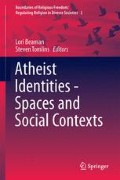Abstract
Explicitly non-religious summer camps for children are a relatively new phenomenon in North America, bringing together a diverse group of people identifying themselves using a variety of terms including, but not limited to, atheists, agnostics, freethinkers, or even brights. After spending a week at Camp Quest Montana I observed that this community felt themselves to be misunderstood by popular and academic representations of atheism. Most striking was the misconception felt by those at Camp Quest that people like themselves who do not believe in gods or religious belief are thought to have a god-shaped hole in their lives where religious belief once existed or should exist. With the utilization of ethnographic methodologies I hope to show that the diverse community brought together by Camp Quest is not one lacking in beliefs, or that believes in nothing. Instead, this paper argues that this pervasive perception regarding non-religious individuals has caused the actual beliefs of this community to become obscured by discourses concerning the logical coherence of atheist texts and statements. This misguided focus has left the individuals at Camp Quest to feel persecuted, misunderstood, and restricted in expressing their beliefs. A better understanding of this small but growing community may provide insights into how non-religious people cannot only recognize their own community but experience feelings of belonging to this community while also revealing pathways towards inclusion that have been overlooked.
Access this chapter
Tax calculation will be finalised at checkout
Purchases are for personal use only
References
Associated Press. 2005. Split rulings on ten commandments displays. NBC News, June 27. http://www.nbcnews.com/id/8375948/ns/us_news/t/split-rulings-ten-commandments- displays/#.UXbmHUoeInh
Bullivant, Stephen. 2010. The new atheism and sociology: Why here? Why now? What next? In Religion and the new atheism: A critical appraisal, ed. Amarnath Amarasingam, 109–124. Leiden: Brill.
Camp Quest Inc. 2011. Mission. http://www.campquest.org/mission
Campbell, Colin. 1971. Toward a sociology of irreligion. London: Macmillan Press.
CBS News. 2012. 9/11 museum, atheists sue over cross. CBS News, September 11. http://www.cbsnews.com/8301-201_162-57494930/9-11-museum-atheists-spar-over-cross/
Cimino, Richard, and Christopher Smith. 2007. Secular humanism and atheism beyond progressive secularism. Sociology of Religion 68(4): 407–424.
Cimino, Richard, and Christopher Smith. 2010. The new atheism and the empowerment of American freethinkers. In Religion and the new atheism: A critical appraisal, ed. Amarnath Amarasingam, 139–158. Leiden: Brill.
Cragon, Ryan T., Barry Kosmin, Ariela Keysar, Joseph H. Hammer, and Michael Nielsen. 2012. On the receiving end: Discrimination toward the non-religious in the United States. Journal of Contemporary Religion 27(1): 105–127.
D’Andrea, Livia M., and Johann Sprenger. 2007. Atheism and nonspirituality as diversity issues in counselling. Counseling and Values 51: 149–160.
Edgell, Penny, Joseph Gerteis, and Douglas Hartman. 2006. Atheists as ‘other’: Moral boundaries and cultural membership in American society. American Sociological Review 71(2): 211–234.
Ehrlich, Howard J., and G. Norman Van Tubergen. 1971. Exploring the structure and salience of stereotypes. Journal of Social Psychology 83(1): 113–127.
Eller, Jack David. 2010. What is atheism? In Atheism and secularity: Volume 1: Issues, concepts and definitions, ed. Phil Zuckerman, 1–18. Santa Barbara: Praeger.
Gervais, Will M., Ara Norenzayan, and Azim F. Shariff. 2011. Do you believe in atheists? Distrust is central to anti-atheist prejudice. Journal of Personality and Social Psychology 101(6): 1189–1206.
Harper, Marcel. 2007. The stereotyping of nonreligious people by religious students: Contents and subtypes. Journal for the Scientific Study of Religion 46: 539–552.
Hout, Michael, and Claude S. Fischer. 2002. Why more Americans have no religious preference: Politics and generations. American Sociological Review 67: 165–190.
Jenks, Richard J. 1986. Perceptions of two deviant and two nondeviant groups. The Journal of Social Psychology 126: 783–790.
Lee, Lois. 2012. Research note: Talking about a revolution: Terminology for the new field of non-religion studies. Journal of Contemporary Religion 27(1): 129–139.
Newport, Frank. 2006. Democrats view religious groups less positively than Republicans. Gallup, September 7. http://www.gallup.com/poll/24385/democrats-view-religious-groups-less-positively-than-republicans.aspx
Pew Forum on Religion & Public Life. 2012. ‘Nones’ on the rise: One-in-five adults have no religious affiliation. Pew Research Center. http://www.pewforum.org/uploadedFiles/Topics/Religious_Affiliation/Unaffiliated/NonesontheRise-full.pdf
SoFree.ca. 2011. CQO history. http://www.sofree.ca/CQOHistory
Spradley, James P., and David W. McCurdy. 1988. The cultural experience: Ethnography in complex society. Prospect Heights: Waveland Press.
Ysseldyk, Renate, Alexander Haslam, Kimberly Matheson, and Hymie Anisman. 2011. Love thine enemy? Evidence that (ir)religious identification can promote outgroup tolerance under threat. Group Processes & Intergroup Relations 15(1): 105–117.
Zuckerman, Phil. 2012. Contrasting irreligious orientations: Atheism and secularity in the USA and Scandinavia. Approaching Religion 2(1): 8–20.
Author information
Authors and Affiliations
Corresponding author
Editor information
Editors and Affiliations
Rights and permissions
Copyright information
© 2015 Springer International Publishing Switzerland
About this chapter
Cite this chapter
Bullivant, S.C. (2015). Believing to Belong: Non-religious Belief as a Path to Inclusion. In: G. Beaman, L., Tomlins, S. (eds) Atheist Identities - Spaces and Social Contexts. Boundaries of Religious Freedom: Regulating Religion in Diverse Societies, vol 2. Springer, Cham. https://doi.org/10.1007/978-3-319-09602-5_7
Download citation
DOI: https://doi.org/10.1007/978-3-319-09602-5_7
Published:
Publisher Name: Springer, Cham
Print ISBN: 978-3-319-09601-8
Online ISBN: 978-3-319-09602-5
eBook Packages: Humanities, Social Sciences and LawPhilosophy and Religion (R0)

